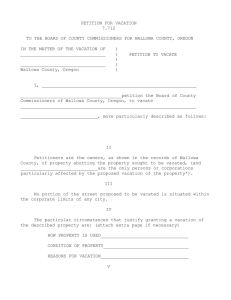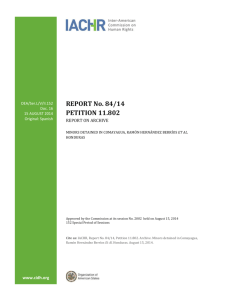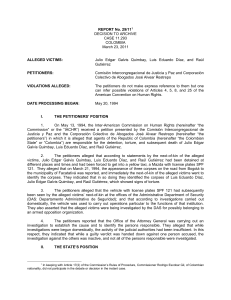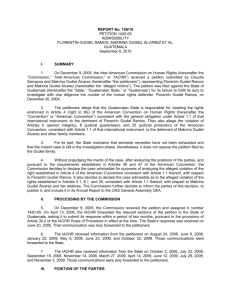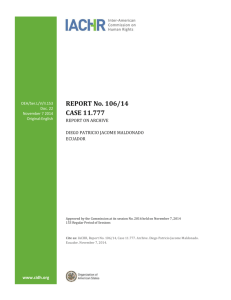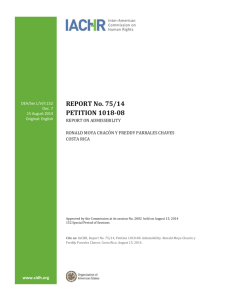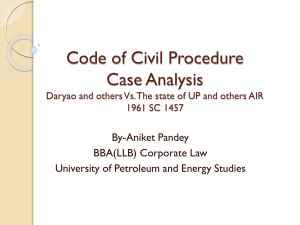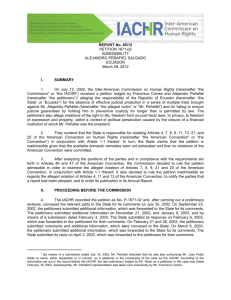Petition 2893-02 (Costa Rica)
advertisement
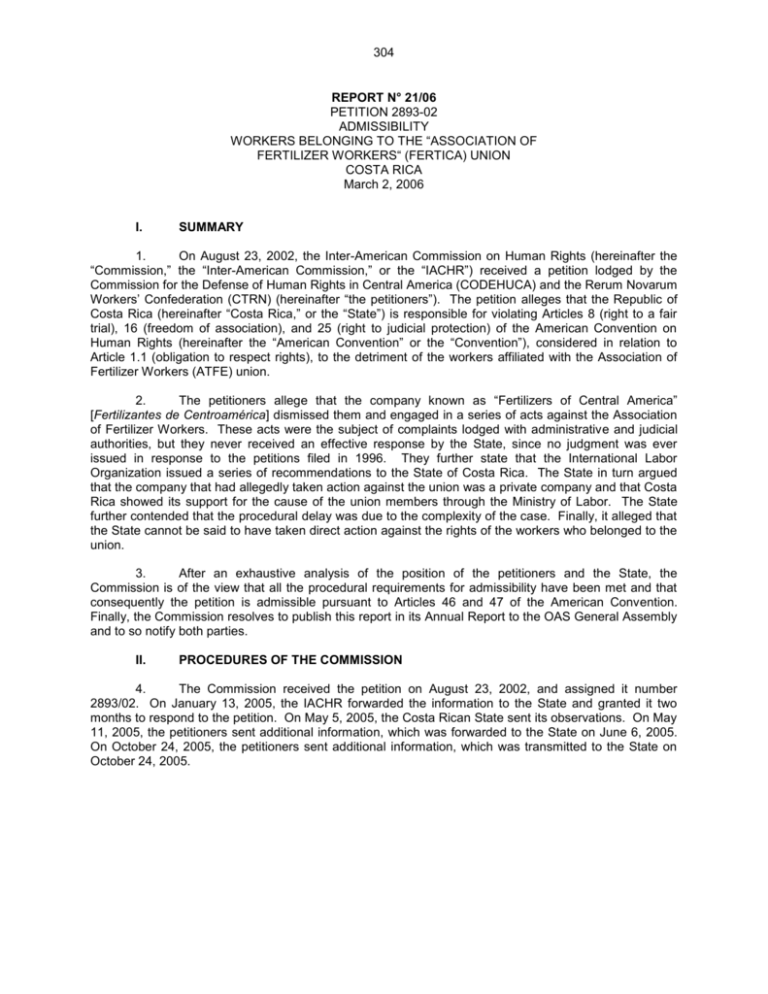
304 REPORT N° 21/06 PETITION 2893-02 ADMISSIBILITY WORKERS BELONGING TO THE “ASSOCIATION OF FERTILIZER WORKERS“ (FERTICA) UNION COSTA RICA March 2, 2006 I. SUMMARY 1. On August 23, 2002, the Inter-American Commission on Human Rights (hereinafter the “Commission,” the “Inter-American Commission,” or the “IACHR”) received a petition lodged by the Commission for the Defense of Human Rights in Central America (CODEHUCA) and the Rerum Novarum Workers’ Confederation (CTRN) (hereinafter “the petitioners”). The petition alleges that the Republic of Costa Rica (hereinafter “Costa Rica,” or the “State”) is responsible for violating Articles 8 (right to a fair trial), 16 (freedom of association), and 25 (right to judicial protection) of the American Convention on Human Rights (hereinafter the “American Convention” or the “Convention”), considered in relation to Article 1.1 (obligation to respect rights), to the detriment of the workers affiliated with the Association of Fertilizer Workers (ATFE) union. 2. The petitioners allege that the company known as “Fertilizers of Central America” [Fertilizantes de Centroamérica] dismissed them and engaged in a series of acts against the Association of Fertilizer Workers. These acts were the subject of complaints lodged with administrative and judicial authorities, but they never received an effective response by the State, since no judgment was ever issued in response to the petitions filed in 1996. They further state that the International Labor Organization issued a series of recommendations to the State of Costa Rica. The State in turn argued that the company that had allegedly taken action against the union was a private company and that Costa Rica showed its support for the cause of the union members through the Ministry of Labor. The State further contended that the procedural delay was due to the complexity of the case. Finally, it alleged that the State cannot be said to have taken direct action against the rights of the workers who belonged to the union. 3. After an exhaustive analysis of the position of the petitioners and the State, the Commission is of the view that all the procedural requirements for admissibility have been met and that consequently the petition is admissible pursuant to Articles 46 and 47 of the American Convention. Finally, the Commission resolves to publish this report in its Annual Report to the OAS General Assembly and to so notify both parties. II. PROCEDURES OF THE COMMISSION 4. The Commission received the petition on August 23, 2002, and assigned it number 2893/02. On January 13, 2005, the IACHR forwarded the information to the State and granted it two months to respond to the petition. On May 5, 2005, the Costa Rican State sent its observations. On May 11, 2005, the petitioners sent additional information, which was forwarded to the State on June 6, 2005. On October 24, 2005, the petitioners sent additional information, which was transmitted to the State on October 24, 2005. 305 III. POSITIONS OF THE PARTIES A. The Petitioners 5. The petitioners allege that on September 9, 1995, the Fertilizers of Central America company (hereinafter “FERTICA”), which until recently was a public enterprise, dismissed all of its workers, 265 of whom were members of the fertilizer workers union (hereinafter “ATFE”). 6. They claim that, as of that date, the aforesaid company ceased to apply the collective bargaining agreement between the union and FERTICA and that it established a policy according to which workers were forced to sign new contracts on less advantageous terms “on the threat of permanently losing their jobs.” They further allege that all of the committees set up under the collective bargaining agreement ceased to operate and that “all the benefits acquired by the workers were abolished.” 7. They further contend that a series of measures to harass the union ensued, such as the dismissal of the entire board of directors of ATFE, and the loss of wages of Indalecio Ordóñez Calvo, Secretary General of ATFE, and Marco Antonio Guzmán Rodríguez, Assistant Secretary General of that union. In addition, they indicate that workers who participated in union activities lost their wages, and that the company refused to recognize the union. 8. They also allege that, based on the these acts, the ATFE lodged a complaint against FERTICA with the National Labor Inspection Department of Costa Rica, for violation of the collective bargaining agreement, unfair practices, and harassment of the labor union. They add that on November 20, 1995, the labor inspectors issued a report stating that the company is liable for the acts cited in the complaint. 9. They argue that on November 30, 1995, the union began a strike at FERTICA, triggered by the aforesaid events, but that said strike, “as virtually all strikes in Costa Rica,” was declared illegal. They further allege that in the report of the International Labor Organization’s Technical Assistance Mission, conducted September 3-7, 2001, concern over this fact was expressed. The report went on to say that “the right to strike is subject to legal requirements and conditions which make it very difficult or impossible to exercise that right legally, and which result in systematic declarations of illegality.” 10. They contend that on November 5, 1995, the National Labor Inspection Department convened the parties to a hearing which resulted in a decision upholding the alleged violations and declaring the merit of the complaints filed by ATFE against FERTICA. 11. They argue that in a July 29, 1996 order, the Ministry of Labor dismissed the appeal filed by FERTICA against the earlier decision. They further contend that the Ministry also ordered the National Labor Inspection Department to lodge a complaint with the appropriate judicial authority for violation of labor laws and to request “the immediate reinstatement of the affected workers and payment of their lost wages.” The petitioners report that the FERTICA company never appeared throughout the hearing and that it filed untimely and unfounded motions with a view to drawing out the proceedings, in an attempt to apply the statute of limitations to the labor law violations. 12. They allege that the Puntarenas City Government Office for Civil and Labor Matters [Alcaldía Civil y de Trabajo], the authority with jurisdiction to hear the complaint, did not recognize the legal authority of AFTE to be a party to the proceedings, and, in a decision dated November 5, 1997, it concluded that the statute of limitations applied to the violations of the labor laws. They further submit that Rodrigo Acuña Montero, in his capacity as labor inspector general, filed an appeal against the City Government Office for Civil and Labor Matters of Puntarenas, and that he, together with the Secretary General of AFTE, filed motions alleging that the earlier legal proceedings of the parties interrupted computation of the limitation, and that the violations of the labor laws were of a continuous nature. 306 13. They indicate that these motions were denied by the Small Claims Court of Puntarenas, by a decision issued on April 23, 1998, and then, on appeal, by the First Civil and Labor Court. They further allege that the Rerum Novarum Workers’ Confederation initiated three amparo procedures for violation of the collective bargaining agreement and for anti-union practices. The Constitutional Chamber of the Supreme Court of Justice declared the amparo procedures without merit, based on the argument that ordinary labor procedures were the most suitable way to resolve the matter. 14. They submit that on February 9, 1996, the ATFE filed a complaint against FERTICA with the Second Circuit Court of San José, for unlawful dismissals. They add that “to date, over six years later and without any justification, no judgment has been pronounced and the proceeding continues to be delayed.” On March 8, 1996, Indalecio Ordóñez Calvo filed a new complaint against FERTICA with the Second Circuit Court of San José for “total” violation of the collective bargaining agreement, but no judgment has yet been handed down in that proceeding either. 15. The petitioners allege that on April 18, 1996, the International Confederation of Free Labor Organizations (CIOSL), acting on behalf of ATFE, lodged a complaint with the ILO’s Committee on Union Freedoms, against the Costa Rican Government for anti-union dismissals, violations of the collective bargaining agreement, and procedural delays. In its report 305, that Committee made the following recommendations: “that the judicial authorities have still not ruled on the complaint (…) which is unsatisfactory, in view of the long period of time that the union members and leaders have had to wait to have their rights restored to them. (…) the Committee expresses its concern over the slow pace and relative inefficiency of the proceedings.” “The Committee requests that all workers dismissed as a result of their union membership or functions be reinstated in their jobs, and that the collective bargaining agreement be observed.” 16. They submit that in view of noncompliance with the cited recommendations, the CIOSL filed another complaint on May 11, 1998, in response to which the ILO Committee on Union Freedoms recommended that Costa Rica adopt new measures to carry out the earlier recommendations related to the case in point, and once again expressed their concern over the slow pace of the proceedings, which is tantamount to “denial of justice.” 17 The petitioners allege that the judicial authorities have proven to be incapable of solving this problem and protecting the violated human rights, “in view of the fact that they have either issued manifestly unfair decisions or have caused unwarranted delays.” 18 They maintain that the petition is admissible on the basis of the exception related to exhaustion of domestic legal remedies, since the domestic jurisdiction has incurred unwarranted delays in adopting a final decision. They add that the matter is not so complex as to warrant a delay of over six years in issuing the relevant judgment, that the interested parties were “extremely” active in taking the necessary procedural steps, and that the judicial authorities have demonstrated an attitude equivalent to denial of justice, as established by the ILO. Therefore, according to the petitioners, the criteria pertaining to the complexity of the case, the procedural activity of the claimants, and the conduct of the judicial authorities have been met, all of which are factors that have been taken into account in the jurisprudence of the Court and Commission, in determining whether the exception of an unwarranted delay is applicable. 307 B. The State 19. The State alleges that the FERTICA company had already passed into private hands on the date of the reported events, and that said company dismissed all workers and made the appropriate legal payments. The 275 members of the ATFE were among the workers dismissed. 20. The State alleges that the National Labor Inspection Department declared without merit the complaints filed for violation of the Collective Bargaining Agreement, unfair labor practices, and unfair harassment or persecution. The State further submits that the appeal filed by FERTICA was dismissed and that the Ministry of Labor ordered the Department to pursue the relevant administrative procedures. 21. The State also alleges that in a decision dated November 5, 1997, the Small Claims Court of Puntarenas (former City Government Office for Civil and Labor Matters) declared that the statute of limitations prevented criminal action for violation of labor and social security laws. On July 13, 1998, that decision was upheld on all points by the First Civil and Labor Court of Puntarenas. 22. The State reports that on October 6, 1996, three FERTICA workers lodged a complaint against AFTE and against Marco Antonio Guzmán Rodríguez with the labor court in Puntarenas. It adds that said case went through several appeal proceedings, and that on final appeal, the Second Chamber of Cassation of the Supreme Court of Justice declared the complaint without merit. The State additionally alleges that three amparo procedures were denied by the Constitutional Chamber, because the judges considered that the matter should be handled through appropriate labor channels. 23. The State also argues that on February 9, 1996, ATFE leaders filed an ordinary labor complaint against FERTICA with the Labor Court of the Second Judicial Circuit of San José, alleging unlawful dismissals in violation of the collective bargaining agreement. On March 8, 1996, Indalecio Ordóñez Calvo, in his capacity as Secretary General of ATFE, filed an ordinary labor complaint against FERTICA with the same court, for violations of the collective bargaining agreement and the Costa Rican labor code. 24. The State maintains that both processes followed “the logical course of labor matters” and that they were not suspended, as the petitioners wrongfully allege. It further contends that both cases are in the stage of rendering judgment, and that FERTICA, as the respondent, has filed several appeals, one of which was denied by the Labor Court of the First Section of the Second Judicial Circuit. 25. The State alleges that there was no unwarranted delay in rendering judgment, because the proceeding progressed on the basis of the actions taken by the petitioners. It further alleges that in 2002, an “incident of abandonment of proceedings” presented by FERTICA was denied, which shows that the petitioners were given opportunities to defend their position. The State further alleges that the petitioners availed themselves of “a wide range of judicial remedies,” but the fact that they filed petitions with administrative and judicial organs at the same time hampered the progress of judicial proceedings, since they rely on information provided by administrative procedures. 26. The State also argues that in the present case, all the necessary judicial guarantees were granted to provide remedies in defense of labor rights. It points out that the Costa Rican State at no time violated due process and that it had always respected freedom of association, which is demonstrated by the support given to the petitioners’ cause by the Ministry of Labor. It also points out that ATFE continues to exist as a labor union. 27. The State maintains that the appropriate way to determine a violation of union freedom, “which is based on freedom of association,” is by filing an ordinary labor complaint, not against the State of Costa Rica, but against the private company, FERTICA. 28. The State contends that the number of complaints filed with administrative authorities, the briefs presented in the relevant labor court, the amparo procedures, and other two complaints filed all testify to the complexity of the case, and therefore justify the time it has taken to render judgments. 308 According to the standards of the Inter-American Court of Human Rights, the fact that a judicial proceeding has been prolonged does not necessarily imply a violation of a reasonable period of time, since to determine that, account must also be taken of factors related to the complexity of the matter, the procedural actions of the interested party, and the performance of the parties. In this case, the judicial authorities “acted in strict compliance with the rules of due process and respect for the equality of the parties.” 29. As regards freedom of association, the State contends that the petitioners have not demonstrated that Costa Rica acted directly against this right. 30. Finally, the State alleges that the reason why the remedies under domestic law have not been exhausted are the administrative and judicial motions and appeals filed by the petitioners. IV. ANALYSIS A. Competence of the Inter-American Commission ratione personae, ratione loci, ratione temporis y ratione materiae 31. The petitioners are authorized by Article 44 of the American Convention to lodge petitions with the IACHR. The petition states that there is a series of alleged victims in respect of whom the Costa Rican State undertook the obligation to respect and guarantee the rights established in the American Convention and in other international instruments. In addition, the Commission notes that Costa Rica has been a party to the American Convention since April 8, 1970, the date on which it deposited its instrument of ratification. Although the State alleges that the acts referred to by the union members were perpetrated by a private company, the Commission has the authority to review the case with regard to action by the state, on the basis of the acts of its judicial authorities and the alleged lack of guarantees offered by the jurisdictional organs. Consequently, the Commission has personal jurisdiction to consider the petition. 32. The Commission has jurisdiction of place to take cognizance of the petition, because the alleged violations of the rights protected by the American Convention took place within the territory of a state party to that instrument, in this case the State of Costa Rica. The Inter-American Commission has jurisdiction ratione temporis, because the obligation to respect and guarantee the rights protected by the American Convention was already in force for the State on the date on which the acts alleged in the petition occurred. Finally, the Commission has jurisdiction ratione materiae, since the petition reports violations of the human rights protected by the American Convention. B. Other requirements for admissibility of a petition 1. Exhaustion of domestic remedies 33. Article 46.1.a of the American Convention states that admissibility of a petition lodged with the Commission is subject to the requirement “that the remedies under domestic law have been pursued and exhausted, in accordance with generally recognized principles of international law.” 34. As regards this requirement for admissibility, the Inter-American Court has already established that this is a mechanism that “permits the State to resolve the problem according to its domestic law before having to face an international procedure, which is particularly valid in the international jurisdiction of human rights […]”.1 In the instant case, the State has alleged that the petitioners failed to comply with this admissibility requirement. 35. The Commission believes it is important to clarify that the exceptions to the rule of exhaustion of domestic remedies are closely linked to the determination of possible violations of certain 1 I/A Court H.R., Velásquez Rodríguez Case. Judgment of July 29, 1988. Series C No. 4, para. 61. 309 rights established in the Convention, such as the right to due process (Article 8) and the right to judicial protection (Article 25). It is important to bear in mind, however, that Article 46.2, by its nature and purpose, sets itself apart from the substantive provisions of the Convention, and relies on a different standard of evaluation than the one used to determine violation of Articles 8 and 25 of this international instrument. Because of this, the applicability of the exceptions to the rule of exhaustion of domestic remedies stipulated in subparagraphs (a), (b), and (c) of Article 46.2 must be decided as a prior, special matter, which is what the Commission is doing by issuing this report. 2 36. Along the same lines, Article 46.2.c of the Convention establishes that this admissibility requirement may not be invoked whenever “there has been unwarranted delay in rendering a final judgment under the aforementioned remedies.” Since an average of 10 years have lapsed since the motions were filed with the corresponding courts, the Commission is of the view that the exception referred to applies in the instant case. 37. The Commission believes that petitioners availed themselves of all the necessary remedies to deal with this delay of justice, which is unwarranted in view of the failure to demonstrate the level of complexity alleged by the State to explain the average of 10 years delay in justice. 2. Deadline for presentation 38. Article 32.1 of the Rules of Procedure of the Commission stipulates that the Commission “shall consider those petitions that are lodged within a period of six months following the date on which the alleged victim has been notified of the decision that exhausted the domestic remedies.” 39. Once the Commission concluded that there was an unwarranted delay in processing the remedies under domestic law and that the exception stipulated in Article 46.2.c of the American Convention applied, it was clear that no final judgment had yet been adopted, and notification of such judgment is meant to serve as a basis for counting the six-month period established under paragraph 1.b of that Article. Nonetheless, the Commission is of the opinion that the petition was lodged within a reasonable period of time from the date on which the victims’ rights were allegedly violated and that therefore the requirement regarding the deadline for presentation was met, in accordance with Article 32 of its Rules of Procedure. 3. Duplication of international procedures and res judicata 40. As the IACHR has already determined in previous cases,3 the fact that the petitioners, acting as a labor union and not as individuals, had recourse to an ILO committee to seek respect for their rights is not grounds for considering a duplication of procedures. The recommendations emanating from the ILO committee in this specific case are different in nature from the procedures involving the interAmerican system for protection of human rights, since said procedure results in a recommendation, and not an “effective settlement of a reported violation.” Therefore, there is no proceeding pending in the ILO or any other international proceeding that would duplicate the nature of the work of the IACHR. 41. In view of the foregoing explanation, the case files do not show that the matter raised in the petition is pending another international proceeding, or that it is identical to a petition already examined by this or another international organization. Consequently, the requirements established in Articles 46.1.c and 47.d of the Convention are considered to have been met. 4. Characterization of the alleged facts 2 IACHR, Admissiblity Report No. 43/02, Petition 12,009, Leydi Dayán Sánchez, Colombia, October 9, 2002, para. 25, IACHR Annual Report for 2002, Report No. 15/02, Admissibility, Case 11.802, Ramón Hernández Berríos et al., Honduras, February 27, 2002, para. 36, IACHR Annual Report for 2002. 3 “The recommendation issued by the Committee on Union Freedom is not legally binding, nor does it provide for monetary restitution or compensation on the part of the State of Nicaragua.” IACHR, Report No. 14/97, Case 11.381, Nicaragua, March 12, 1997. 310 42. The Commission is of the view that the allegations of the petitioners regarding the alleged violations of rights protected by the American Convention, if proven, could characterize a violation, to the detriment of the alleged victims, of the right to a fair trial, freedom of association, and the right to judicial protection, guaranteed in Articles 8, 16, and 25, considered in conjunction with Article 1.1 of the American Convention. 43. By virtue of the foregoing, in examining the merits of the petition, the Commission will have to determine whether the unwarranted delay of 10 years in rendering a decision on the remedies pursued is a violation of judicial guarantees related to a reasonable period of time (Article 8.1 of the Convention), and whether the alleged victims had access to simple, prompt, and effective recourse to a competent court or tribunal, which would have guaranteed them the right to justice and judicial protection established in Article 25 of the Convention. It must further determine whether there was a violation of the right to freedom of association established in Article 16 of that international instrument, which occurred by way of the alleged unwarranted delay of the judicial authorities. 44. The Commission points out that the foregoing considerations do not imply prejudgment of the merits of the petition, since determination of the actual existence of the violations alleged will depend on examination of the merits in the light of the entire body of evidence available to it. V. CONCLUSION 45. The Commission concludes that the case is admissible and that it is competent to examine the complaint lodged by the petitioners in relation to the alleged violation of Articles 8, 16, and 25, considered together with Article 1.1, of the American Convention, in accordance with Articles 46.1.c, 46.1.d, 46.2.c and 47.b of that international instrument, and pursuant to Articles 28 and 37 of the Commission’s Rules of Procedure. 46. On the basis of the factual and legal arguments set forth above, and without prejudice to the merits of the case, THE INTER-AMERICAN COMMISSION ON HUMAN RIGHTS DECIDES: 1. To declare this petition admissible, in relation to Articles 1.1, 8, 16, and 25 of the American Convention. 2. To notify the State and the petitioners of this decision. 3. To initiate procedures on the merits of the case. 4. To publish this decision and include it in its Annual Report, to be submitted to the OAS General Assembly. Done and signed in the city of Washington, D.C., on the 2nd day of the month of March, 2006. (Signed): Evelio Fernández Arévalos, President; Paulo Sérgio Pinheiro, First Vice-President; Florentín Meléndez, Second Vice-Presidente; Clare K. Roberts, Freddy Gutiérrez, Paolo G. Carozza and Víctor E. Abramovich, Commissioners.
